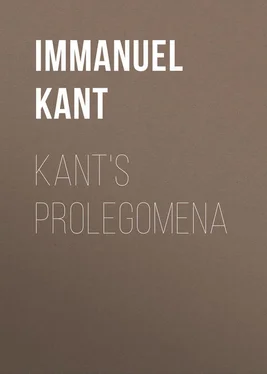Immanuel Kant - Kant's Prolegomena
Здесь есть возможность читать онлайн «Immanuel Kant - Kant's Prolegomena» — ознакомительный отрывок электронной книги совершенно бесплатно, а после прочтения отрывка купить полную версию. В некоторых случаях можно слушать аудио, скачать через торрент в формате fb2 и присутствует краткое содержание. Издательство: Иностранный паблик, Жанр: Философия, foreign_antique, foreign_prose, на английском языке. Описание произведения, (предисловие) а так же отзывы посетителей доступны на портале библиотеки ЛибКат.
- Название:Kant's Prolegomena
- Автор:
- Издательство:Иностранный паблик
- Жанр:
- Год:неизвестен
- ISBN:нет данных
- Рейтинг книги:5 / 5. Голосов: 1
-
Избранное:Добавить в избранное
- Отзывы:
-
Ваша оценка:
- 100
- 1
- 2
- 3
- 4
- 5
Kant's Prolegomena: краткое содержание, описание и аннотация
Предлагаем к чтению аннотацию, описание, краткое содержание или предисловие (зависит от того, что написал сам автор книги «Kant's Prolegomena»). Если вы не нашли необходимую информацию о книге — напишите в комментариях, мы постараемся отыскать её.
Kant's Prolegomena — читать онлайн ознакомительный отрывок
Ниже представлен текст книги, разбитый по страницам. Система сохранения места последней прочитанной страницы, позволяет с удобством читать онлайн бесплатно книгу «Kant's Prolegomena», без необходимости каждый раз заново искать на чём Вы остановились. Поставьте закладку, и сможете в любой момент перейти на страницу, на которой закончили чтение.
Интервал:
Закладка:
This division is indispensable, as concerns the Critique of human understanding, and therefore deserves to be called classical, though otherwise it is of little use, but this is the reason why dogmatic philosophers, who always seek the sources of metaphysical judgments in Metaphysics itself, and not apart from it, in the pure laws of reason generally, altogether neglected this apparently obvious distinction. Thus the celebrated Wolf, and his acute follower Baumgarten, came to seek the proof of the principle of Sufficient Reason, which is clearly synthetical, in the principle of Contradiction. In Locke's Essay, however, I find an indication of my division. For in the fourth book (chap. iii. § 9, seq.), having discussed the various connexions of representations in judgments, and their sources, one of which he makes "identity and contradiction" (analytical judgments), and another the coexistence of representations in a subject, he confesses (§ 10) that our a priori knowledge of the latter is very narrow, and almost nothing. But in his remarks on this species of cognition, there is so little of what is definite, and reduced to rules, that we cannot wonder if no one, not even Hume, was led to make investigations concerning this sort of judgments. For such general and yet definite principles are not easily learned from other men, who have had them obscurely in their minds. We must hit on them first by our own reflexion, then we find them elsewhere, where we could not possibly have found them at first, because the authors themselves did not know that such an idea lay at the basis of their observations. Men who never think independently have nevertheless the acuteness to discover everything, after it has been once shown them, in what was said long since, though no one ever saw it there before.
Were a metaphysics, which could maintain its place as a science, really in existence; could we say, here is metaphysics, learn it, and it will convince you irresistibly and irrevocably of its truth: this question would be useless, and there would only remain that other question (which would rather be a test of our acuteness, than a proof of the existence of the thing itself), "How is the science possible, and how does reason come to attain it?" But human reason has not been so fortunate in this case. There is no single book to which you can point as you do to Euclid, and say: This is Metaphysics; here you may find the noblest objects of this science, the knowledge of a highest Being, and of a future existence, proved from principles of pure reason. We can be shown indeed many judgments, demonstrably certain, and never questioned; but these are all analytical, and rather concern the materials and the scaffolding for Metaphysics, than the extension of knowledge, which is our proper object in studying it (§ 2). Even supposing you produce synthetical judgments (such as the law of Sufficient Reason, which you have never proved, as you ought to, from pure reason a priori , though we gladly concede its truth), you lapse when they come to be employed for your principal object, into such doubtful assertions, that in all ages one Metaphysics has contradicted another, either in its assertions, or their proofs, and thus has itself destroyed its own claim to lasting assent. Nay, the very attempts to set up such a science are the main cause of the early appearance of scepticism, a mental attitude in which reason treats itself with such violence that it could never have arisen save from complete despair of ever satisfying our most important aspirations. For long before men began to inquire into nature methodically, they consulted abstract reason, which had to some extent been exercised by means of ordinary experience; for reason is ever present, while laws of nature must usually be discovered with labor. So Metaphysics floated to the surface, like foam, which dissolved the moment it was scooped off. But immediately there appeared a new supply on the surface, to be ever eagerly gathered up by some, while others, instead of seeking in the depths the cause of the phenomenon, thought they showed their wisdom by ridiculing the idle labor of their neighbors.
The essential and distinguishing feature of pure mathematical cognition among all other a priori cognitions is, that it cannot at all proceed from concepts, but only by means of the construction of concepts (see Critique II., Method of Transcendentalism, chap. I., sect. 1). As therefore in its judgments it must proceed beyond the concept to that which its corresponding visualisation ( Anschauung ) contains, these judgments neither can, nor ought to, arise analytically, by dissecting the concept, but are all synthetical.
I cannot refrain from pointing out the disadvantage resulting to philosophy from the neglect of this easy and apparently insignificant observation. Hume being prompted (a task worthy of a philosopher) to cast his eye over the whole field of a priori cognitions in which human understanding claims such mighty possessions, heedlessly severed from it a whole, and indeed its most valuable, province, viz., pure mathematics; for he thought its nature, or, so to speak, the state-constitution of this empire, depended on totally different principles, namely, on the law of contradiction alone; and although he did not divide Judgments in this manner formally and universally as I have done here, what he said was equivalent to this: that mathematics contains only analytical, but metaphysics synthetical, a priori judgments. In this, however, he was greatly mistaken, and the mistake had a decidedly injurious effect upon his whole conception. But for this, he would have extended his question concerning the origin of our synthetical judgments far beyond the metaphysical concept of Causality, and included in it the possibility of mathematics a priori also, for this latter he must have assumed to be equally synthetical. And then he could not have based his metaphysical judgments on mere experience without subjecting the axioms of mathematics equally to experience, a thing which he was far too acute to do. The good company into which metaphysics would thus have been brought, would have saved it from the danger of a contemptuous ill-treatment, for the thrust intended for it must have reached mathematics, which was not and could not have been Hume's intention. Thus that acute man would have been led into considerations which must needs be similar to those that now occupy us, but which would have gained inestimably by his inimitably elegant style.
Metaphysical judgments, properly so called, are all synthetical. We must distinguish judgments pertaining to metaphysics from metaphysical judgments properly so called. Many of the former are analytical, but they only afford the means for metaphysical judgments, which are the whole end of the science, and which are always synthetical. For if there be concepts pertaining to metaphysics (as, for example, that of substance), the judgments springing from simple analysis of them also pertain to metaphysics, as, for example, substance is that which only exists as subject; and by means of several such analytical judgments, we seek to approach the definition of the concept. But as the analysis of a pure concept of the understanding pertaining to metaphysics, does not proceed in any different manner from the dissection of any other, even empirical, concepts, not pertaining to metaphysics (such as: air is an elastic fluid, the elasticity of which is not destroyed by any known degree of cold), it follows that the concept indeed, but not the analytical judgment, is properly metaphysical. This science has something peculiar in the production of its a priori cognitions, which must therefore be distinguished from the features it has in common with other rational knowledge. Thus the judgment, that all the substance in things is permanent, is a synthetical and properly metaphysical judgment.
Читать дальшеИнтервал:
Закладка:
Похожие книги на «Kant's Prolegomena»
Представляем Вашему вниманию похожие книги на «Kant's Prolegomena» списком для выбора. Мы отобрали схожую по названию и смыслу литературу в надежде предоставить читателям больше вариантов отыскать новые, интересные, ещё непрочитанные произведения.
Обсуждение, отзывы о книге «Kant's Prolegomena» и просто собственные мнения читателей. Оставьте ваши комментарии, напишите, что Вы думаете о произведении, его смысле или главных героях. Укажите что конкретно понравилось, а что нет, и почему Вы так считаете.












